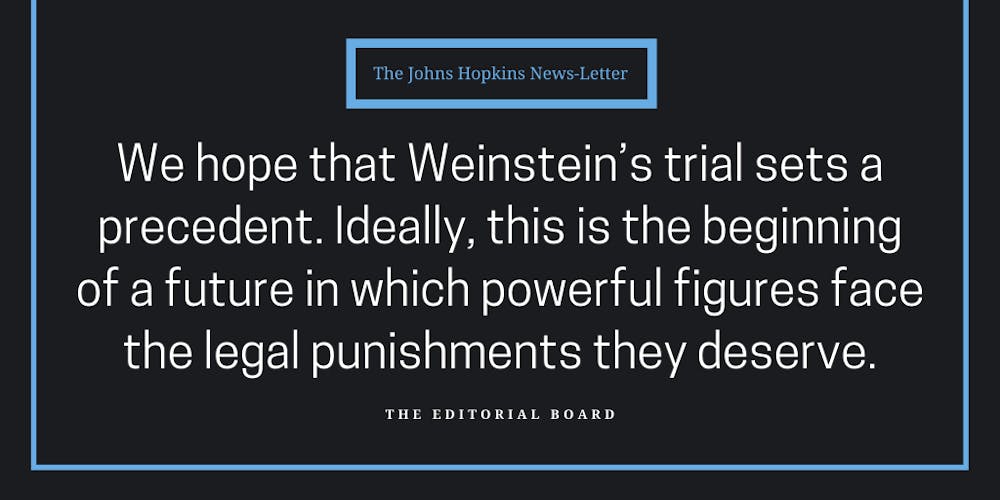For decades, Harvey Weinstein preyed on women in the film industry. And for decades, he got away with it. As a wealthy Oscar-winning producer and co-founder of Miramax and The Weinstein Company, Weinstein was one of the most powerful men in Hollywood, and he seemed invincible.
Now, as of Monday, Weinstein is a convicted sex offender. While he was acquitted of three charges, including predatory sexual assault, the former film producer left his trial in handcuffs, guilty of rape and a first-degree criminal sexual act. He will be sentenced in March and may face up to 29 years of prison.
For survivors and women across the world, this is a groundbreaking moment. It is also a moment of justice all too rare and one that took decades too long. Weinstein’s guilty verdict not only reminds us of how far we have come, but also of how much further we have to go.
As early as the 1970s, Weinstein was abusing women. It was not until 2017 that the New York Times and The New Yorker first reported on the sexual assault allegations against him. Few could have predicted the movement that would ensue, or the repercussions a powerful, wealthy man like Weinstein would face. Almost immediately after, however, he was fired from his own company. Months later, he was arrested and charged with rape. The scope of the allegations meant that for once, a man as powerful as Weinstein fell swiftly from his pedestal.
As soon as Weinstein’s allegations broke, countless survivors started to come forward about their own experiences of sexual assault and harrassment by other prominent figures. Since April 2017, over 260 celebrities, politicians, and notable figures — most of which have been men — have been accused. Many of these figures have fallen out of power.
The Me Too movement is, in fact, over a decade old. Founded in 2006 by Tarana Burke, it provides survivors of sexual violence with a community in which to share their experiences, seek support and heal. It was not until the allegations against Weinstein broke, however, that the movement exploded. By saying #MeToo, survivors were able to affirm that they were not alone. Our culture dramatically shifted from a culture where sexual assault was brushed aside to one that did a better job of listening to survivors and holding abusers accountable.
What happened earlier this week may feel like a culmination of that movement, and Weinstein’s accusers finally won their long-fought battle. But Weinstein is merely one abuser, a symptom of a culture that is still largely dominated by other powerful men. For the majority of abusers, justice has not been served.
The significance of Weinstein’s conviction cannot be understated. Since 2017, the reputations of many popular public figures have suffered. But Weinstein is one of the first prominent figures to actually face legal repercussions for sexual assault.
Shortly before the 2016 U.S. presidential elections, The Washington Post published footage of Donald Trump boasting that as a star, he could do anything and grab women by the pussy. Months later, he was President of the United States. As of 2019, over 25 women have accused Trump of sexual misconduct.
In September 2018, Christine Blasey Ford courageously stepped forward in front of the Senate Judiciary Committee, testifying that Brett Kavanaugh assaulted her more than three decades ago. Ford faced backlash from Kavanaugh’s allies, and after an emotionally taxing four day trial, the Senate voted to confirm Kavanaugh’s nomination as U.S. Supreme Court Justice. Two years later, he is still in power.
We hope that Weinstein’s trial sets a precedent. Ideally, this is the beginning of a future in which powerful figures face the legal punishments they deserve.
And in our own community, we’ve seen small victories since 2017. Here at Hopkins, we’ve noticed a change in the way we talk about sexual assault on campus. More often, fraternities formally accused of sexual assault are investigated and even shut down. One professor who broke the University’s sexual misconduct code was fired and had his tenure revoked, and another resigned.
However, the 2019 Campus Climate Survey indicates that sexual assault is still prevalent at Hopkins. 42.2 percent of female and 10.8 percent of male undergraduate students believe it is somewhat likely, very likely or extremely likely that they will experience either sexual assault or misconduct at Hopkins. This indicates that the culture perpetuated by abusers such as Weinstein still exists. Hopkins, and the rest of society, must do more to lower these numbers.
For far too long, it seemed like nothing would happen to Weinstein. The fact that he’s finally been taken down is a huge accomplishment. We are glad that the women who were survivors of his crimes now get some semblance of justice.
However, we must be clear: this is not the end. Weinstein is one man, but he represents a whole culture in which sexual assault allegations are swept under the rug. The legal system and society have made huge strides in sending someone as powerful as Weinstein to jail. Yet there are many who are never brought before a court at all.
We must all continue to create an environment in which survivors can come forward, where allegations are taken seriously and where abusers are punished for their crimes. Weinstein’s conviction is a watershed moment. It shouldn’t be.





